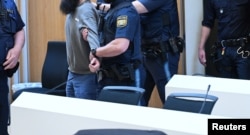The career path of Dieter S. ran from an illegal armed group in eastern Ukraine in 2014 to a Russian terrorist cell in Germany, a high-security courtroom in Munich heard this week.
German prosecutors alleged that he and two other men planned explosive and arson attacks on various targets, including a US military base, a loading facility, and an oil plant.
His lawyer said he’s “not a spy, not a saboteur,” describing instead a regular guy with a job constructing stands at trade fairs before falling on hard times during the COVID-19 pandemic.
The case has been described as a textbook illustration of how Russian intelligence now operates in Europe: outsourcing risky tasks to casual, cheap recruits instead of using its own agents.
“It’s a particularly vivid example,” Frank Umbach, a security expert at Bonn University, told RFE/RL.
“Because it concerns spying on military facilities that are directly connected to military support for Ukraine, such as one where military training for Ukrainian officers and troops takes place,” he said.
'Disposable Agents'
The court hearings that began on May 20 against three joint German-Russian nationals came just days after German prosecutors charged three Ukrainian citizens with planning sabotage.
The two cases are the latest in a series involving low-level, “disposable” Russian agents across Europe. Also this week, the deputy head of Germany’s domestic intelligence agency, Sinan Selen, reportedly warned that Russia was increasingly using such agents.
“‘Disposable agents’ is a term for people who are recruited for these attacks,” said Umbach.
“Criminal elements are approached. Often people are recruited over the darknet or on Telegram and other platforms. Often, they’re people who just want to earn some money.”
In Munich, the three men in the dock were arrested in April last year.
Prosecutors allege that Dieter S., the ringleader, was in contact with a Russian secret service agent that he met years earlier when he was a member of a Russian-backed separatist group in eastern Ukraine.
“The accused fought…at Donetsk airport in the winter of 2014-15 and in the small town of Mariyinka in June 2015,” they said.
In 2023, living in Germany, he allegedly began exchanging plans with his handler before recruiting his two accomplices, who lived nearby.
“Alexander J. and Alex D. were helping him by March 2024 at the latest,” prosecutors said.
They were reportedly an auto mechanic and a graphic designer.
All three men insist they are innocent.
'Ordinary People'
According to German authorities, the three Ukrainian men, who were charged on May 14, had similarly innocuous backgrounds.
“The first impression is of low-level agents -- people who...are recruited for not much money and who then do the job for the Russian state,” said Herbert Reul, interior minister of Germany’s North-Rhine Westphalia region.
"These people, the direct perpetrators, are 99% not members of any network. They could be just ordinary hired people," Roman Kostenko, a colonel in Ukraine’s main security agency, the SBU, told RFE/RL’s Ukrainian Service.
Kostenko, who is also a lawmaker, added that they “may not even have known which country they were working for.”
But former Ukrainian intelligence officer Vasyl Bohdan told RFE/RL that it was relevant in this case that Ukrainians had allegedly been recruited.
“Putin is trying in every way to compromise Ukraine,” he said, adding that among Ukrainian refugees in Europe there were people who “are primarily interested in making a quick buck somewhere.”
This may have been the case with Ukrainian refugee Serhiy S., who was sentenced to eight years in prison by a Polish court in February for planning arson attacks on civilian buildings in Wroclaw.
He denied the charges but admitted had he agreed to commit arson in return for money from an unknown party he communicated with online. The 51-year-old was reportedly offered $4,000.
A Growing Threat
Law enforcement agencies are dealing with similar cases across Europe, with alleged perpetrators from a variety of countries.
“The more eye-catching shift this year has been Russian state actors turning to proxies for their dirty work, including private intelligence operatives and criminals from both the UK and third countries,” said Ken McCallum, the head of Britain’s MI5 counter-intelligence service in a speech in October.
This month, British authorities arrested two Ukrainians and a Romanian over fires at property linked to Prime Minister Keir Starmer. The case is being investigated by a counterterrorism unit but has not been linked officially to Russian intelligence though there are suspicions of ties among some.
Across Europe, the sheer breadth of possible targets and the rise of cases presents security services with a significant challenge.
“The danger from so-called disposable or dual-use agents is constantly rising,” German lawmaker Konstantin von Notz told RFE/RL.
Von Notz, who represents the opposition Green Party, sits on the parliamentary committee that oversees German intelligence agencies.
“The counterintelligence services need to be reorganized…for a better and more appropriate response to the threat,” he said.
In Munich, state prosecutors said the sabotage was aimed at “undermining German military support for Ukraine against Russia’s war of aggression.”
Umbach, the Bonn University security expert, said acts such as these carried a message to European governments that their support for Ukraine comes at a price.
But there was also, he said, a message to the civilian population: “You are vulnerable. And your state, your governments, cannot guarantee you 100 percent security.”













